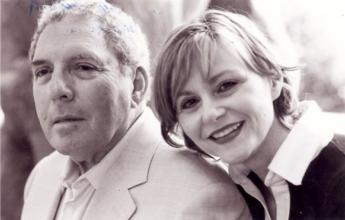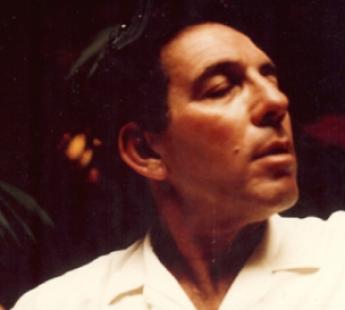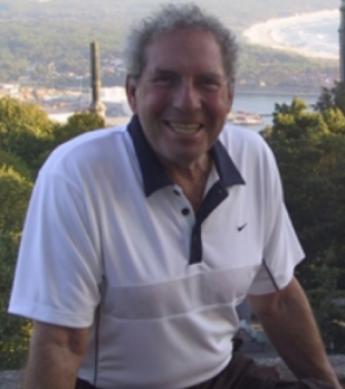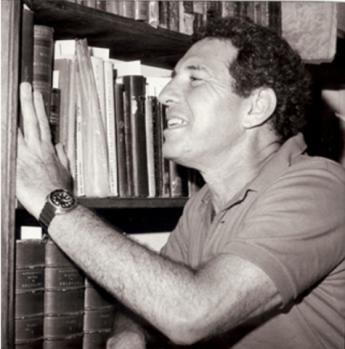Antiquarian Booksellers' Association of America Weber Rare Books
Howard Karno (1930-2012) & Howard Karno Books

By Jeff Weber
Howard Laurence Karno was born in Los Angeles August 15, 1930, the first of three children, to Dave Karno (b. 1909) and Ann Lukoff Karno, who was born in Philadelphia but moved to Los Angeles when she was three years old.
The Karno family was Jewish and emigrated from Lithuania, Russia, where the surname was Karnofsky. Howards father was a self-made man, an entrepreneur whose business interests included a trucking company, liquor trade, clothing, pharmaceuticals, and as owner of a large parking business enterprise with as many as twenty lots in Los Angeles. Howards mother was a homemaker; later she became a professional caterer. Howard said She never made money because she spent so much on the wine, everything was the best. She was a world traveler. A real Auntie Mame, thats the best way to describe her. When Howard was young she would make a chocolate cake every day for the kids so when they got home there was something welcoming. The sharing of food and the enjoyment of it became a center piece for Howards adulthood. Food and the parties represented his affinity for people and wanting everyone to have a good time.
From a young age Howard suffered from asthma; an ailment that he attributed to a stay at Monrovia Health Camp when he was five years old. Over the years he endured many health concerns including Polio and Parkinsons disease.
Howard Karno could be characterized as having a real interest in people, especially in women. He had an incredible empathy for people; his collegiality also contributed to his becoming a successful bookseller. He was always welcoming to new people in the trade or as friends. He was truly a good-hearted person ; if someone was new to the book trade or to a party, etc., he would embrace them and make them feel a part of the group this radiated from him. Karno was quick-witted and he loved a good time, sometimes playing a practical joke.
Other passions for Howard were exotic sport cars he loved them and he knew something about many cars. His first car was a legendary rare SS100 1937 Swallow, called the SS for Swallow Sidecar. At other times Karno owned two Austin Martin (DB 2 and DB 4) sports cars, made famous by James Bond. He was known to open up the throttle and let a car go at full-speed, twist around a curve. Beware the youngster who was of driving age: Howard was known to show off these cars and what they could do on the road all in fun and maybe with some element of danger. Old movies and cigars were as much a passion as fast cars. He loved experiencing life in a way that all would say was a genuine lust for Howard.

Howards formal education started when he entered UCLA in 1948 and a semester later transferred to Southern Methodist University. Soon, however, he returned back to Los Angeles and worked at his fathers parking lot business. In 1950 he joined the Air Force, collecting radar intelligence and serving four years in New Jersey. About this time he married Deanne Grant (having four children with her).
There finally came a time to start a new direction in life. He returned to junior college to re-qualify for UCLA; it was 1961 and this time he earned his M.A. and a Ph.D. in Latin American history, graduating in 1970.
It was in the early 1960s when Howard made his trip to Mexico it became a life-changing experience that led to his becoming a specialist bookseller. He took trip to South America and loved the journey, visiting places like Buenos Aries, Santiago, Rio de Janeiro, and Lima. In Mexico he met a girl with whom he became smitten. Karno had wanted to study history of the British Commonwealth, but this trip triggered what became a life-long interest in Latin America; for him it has an inspirational trip. In Lima he met a British consul who encouraged him to pursue his academic studies on the history of Peru. This led to visiting the National Archives and compiling a history of Augusto B. Leguia, the Peruvian dictator from 1919-1931 and President in 1905-1909. His thesis, Augusto B. Legui?a: the oligarchy and the modernization of Peru, 1870-1930, was submitted at UCLA in 1970 for which we earned his doctorate in Latin American history.
During the 1960s I was active in the anti-war effort; the Vietnamese War. Karno started with a friend a group called Pledge for Peace that encouraged Americans not to buy new American cars (but old ones were OK!).

Karno was well-read and in conversation he could seemingly talk about almost anything intelligently. He knew a lot about World War II, old time movies, cars and travel. He could even discuss the keener points of medicine. Howard was known to impress his grandson (who was studying for a medical degree) with the knowledge he had of medicine. This is a common trait of senior booksellers: becoming a walking encyclopedia of random bits of knowledge.
Karno began teaching history at high schools in Los Angeles and then at Santa Monica City College before landing a position at UCLA. But he was more interested in research than teaching.
At this time he divorced and married Julie Lop, a union that lasted seven years.
Howard was known for his parties and offering generous portions and a wide selection of exotic foods. There was often a lively party with plenty of good home-cooked food. Serving food was a gratifying way to receive friends and colleagues. For Karnos party celebrating his Ph.D.: The children all pitched in with time and effort and made anticuchos, which are beef hearts on a stick. We prepared huge quantities of anticuchos with anticucho sauce. Some were a bit disgusted by the entr and tossed it, going home hungry!
In the 1970s he married again, this time to Maria Searson, an executive secretary at Oxford University Press, New York. This was a time in his life that he tried work as a publishers representative, but he was over-educated for this role. Then Karno applied for position as director of See & Do Foundation, a drug rehabilitation center in San Bernardino. In a way it got him back to books as Karno formed a library for the center. His oral history describes having a roommate who had a pet monkey: There is nothing filthier than a monkey in his cage and we were in the next room. It was not interesting. The center itself had a modest level of success but the interest for listening to the teenagers with their harrowing stories was more than it was worth for him. Both he and Maria went on to other things.
Karnos father refused to allow the now highly-educated, but unemployed, Howard back into the parking business, thus forcing him to find another occupation. That led me into the book business. Howard couldnt find an internship at a book shop, so he took his dissertation books, borrowed some money, and started Libros Latinos. That was 1973 and it became the first specialty book store for Latin Americana, thus pioneering the field for the United States. At first academic and scholarly books was the specialty, gradually adding some antiquarian books. He took on a partner (25% to Howard Madden; then another undisclosed share to George Elmendorf). The partnership was not sustainable and that led to selling his own share of the business, thus the start of Howard Karno Books was in 1975. Soon Karno became a member of the Antiquarian Book Dealers Association of America and its parent organization, the International League of Antiquarian Booksellers.

Karno said, Im a haunter of book stores. I have been ever since I was a teenager. I just love books, and I would haunt the antiquarian book shops in Hollywood. He met Federico Schwab in Lima Peru during his studies for his doctoral thesis, owner of the Iturriaga book store, and would later write about him: Federico Schwab: An Appreciation. In this short description of Schwab and his store Karno spoke highly of Don Federico, his efficiency, reliability and honesty, deservedly earned for his firm the utmost respect from librarians, book dealers and collectors. One could easily be hearing the same being said of Karno today for he was honest and much deserving in respect for his achievement in Latin American bookselling.
Russ Davidson, curator of Latin American and Iberian Collections at the University of New Mexico, writes: Howard Karno Books have made a lasting contribution to the study of Latin American history and culture, it is nonetheless Howard Karno the man who will be remembered by most, remembered for his exuberant love of life and bottomless well of kindness and generosity, his undying interest in the world and all that it contained, his gift of laughter and love of conversation, and his great devotion to family and friends and commitment to social justice.
Karno also went to his first SALALM conference in 1975, establishing a pattern of courting librarians interested in Latin American studies. For this program his mother cooked for the first bookseller party there and it was such a highlight that people still talk about it after 25 years. She cooked for three hundred people. A pack of wolves doesnt match a pack of librarians when theyre hungry and have really good food to eat.
Karno also started making subject specific lists to offer libraries, including books on canals, railroads, genealogy, etc. In this way he began making regular lists of books for sale and notifying libraries. The British Library was an early customer to buy from Howard Karno Books, but it took much longer to get the attention of some key American librarians.
Very early, probably five years into the business, I came across sixteenth century manuscripts, from the Pizarro family in Peru. I called Emma [Simonson at Indiana] and said, Emma, Ive got some Pizarro manuscripts here. She said, What do you want for them? $5,000. Send them.(laughter). It was marvelous! I worked also with Bancroft because I was finding some good material at that time. I went down to Mexico and looked for manuscripts, letters, etc. and they were rather plentiful. People wanted to sell them in the United States for dollars and [theyd] know that they werent being thrown out the window or used as toilet paper or mistreated.
A mainstay of Karnos business was frequent travel. The following were destinations on his itinerary: Peru, Brazil, Argentina, Columbia, Uruguay, Paraguay, Chile, Ecuador (including the Galapagos Islands), Venezuela, Panama, Bolivia, Mexico, Costa Rica, Cuba, Puerto Rico, Finland, Turkey, Portugal, Barbados, Germany, Belgium, Luxembourg, Spain, Russia, Japan, [and] Canada.
Among some of Karnos most notable book buys are: for USC he acquired a 1611 Cervantes. For the University of New Mexico Karno built a Medina collection. Recently Karno found and sold a copy of the first book written by the famous Mexican feminist Sor Juana Ines de la Cruz (1651-1695), who defended a womens right to education. Though a nun, she was a brilliant women, a noted poet and writer, and became noted for standing up to the Arch Bishop. Her books are very rare on the market.
In 1979 there was another change in life: Howard met Beverly Joy Lishner. They got married and stayed together for the rest of Howards life. Through her efforts the bookstore began emphasizing Latin American art and architecture. The firm built a business in supplying new art books to libraries around the world. The blanket orders (for all Latin American art and architecture books) kept the business going well.
In their home Howard and Beverly had a remarkable collection of original photographs and folk art from Latin America, supporting the art they loved. Many pieces were bought from Mexican street venders and some became famous, like Pedro Linares (1906-1992) who was the creator of the colorful fantastical fierce creatures made of paper machand called alebrijes. They bought a lot of Day of the Dead objects, all in support of what they enjoyed. The idea that people would go to a cemetery and have a good time together, laughing and talking stories, really appealed to Howard and it soon became a part of their own lives.
As the business grew the Karnos began regularly exhibiting in South American bookfairs such as S Paulo, Rio de Janeiro, Buenos Aires, Bogot Lima, Santiago, Mexico and Guadalajara.
Another important transaction for the Karnos was brokering a deal for a Carl Linnaeus collection. Linnaeus was one of the early western naturalists to visit Japan. They were able to find a Japanese museum to purchase the entire collection.
According to Karno, one remarkable anecdote began with a librarian ribbing Howard with an order for a fictitious book: a supposed second edition by Cesar Ensalada Chavez on the California Prune Pickers Strike of 1932. No such thing exists. Howard found a Korean imprint, torn off the title-page, making it by Chavez, supplied it to the library (the University of Virginia), with a bill for $15 and they not only paid it, they also submitted it for LC cataloging! Somehow practical jokes were often a part of Howards life.
What Karno calls one of his greatest finds was: 52 Inquisitional legatos or procesos, the actual trial records, often three or four hundred leaves each, dating from the 1590s. They included the records of the Carvajal family trials; how some were executed by fire for not renouncing their religion (Jewish). The trials involved crimes by priests, animal bestiality, gay marriage, the benefits of homosexuality, etc. One proceso contained the hangmans rope of one of the people who had hung themselves in jail. Another one had knuckle bones a that supposedly were magical. They were bound in a little purse. The collection was expensive, turned down by a Mexican library, but it landed at Berkeley. [See: BANC MSS 96/95 m; 23 volumes.]
Howard and Beverly were frequent travelers and offered that their flights to Mexico and Latin America were sometimes as many as ten times a year. They would go to conferences, meet with booksellers, librarians and friends. Their travels took them also to Germany, Cuba, and Jamaica.
For a long time Beverly has been groomed to take over the business and she has, in recent years, been the force behind all things happening at Howard Karno Books. Howard was quoted saying she is the heart and soul of the business. She is everything. This is both an expression of his love for her and his regard for her devotion to the business, which was so very rewarding to both of them. Once asked if any of his six children, all of them now successful on their own, were interested in the business, Karno responded, probably with a knowing twinkle in his eye, None are interested at all. They want to make money. For Karno money was not the most important element; he was principled, honorable, and always willing to listen and eager to learn. His world was one of good fun and a love of art and life. Stacey Elson wrote, His unwavering love, friendship, and genuine interest in knowing who I was, touched me and helped me to see life in a different way.
Jeff Weber wrote for Howards memorial, I was entering the booktrade in 1978, working for Jake Zeitlin. It was from Howard that I always enjoyed a warm relationship that was welcoming from his heart right from the start. Howard gave me a copy of Armand Coppens The Memoirs of an Erotic Bookseller. From that book I judged that Howard was a true romantic at heart! He was absolutely unique: my eye was drawn to the wonderfully colored Mexican sculptures around the store and then at his home. I remember going to gatherings at the home and enjoying company, seeing some more books and laughing while having a good time. While Beverly was in the home and store all was brightened and joyful.
Howard Karnos last exhibition was at the ABAA bookfair in Pasadena in February 2012. He had his best fair in four years and he was ecstatic. It was memorable for some fine sales and the enjoyment of seeing so many people come to visit. The firm will continue to exhibit in the future.
For decades, he had bravely fought and won battles against various ailments including leukemia, Parkinsons disease, and life-long asthma. Karno had, at around 1945 (at 15 years of age), been swimming at Catalina Island, where he succumbed to polio. He received the Sister Kenny treatment (that became popular in Australia in the late 1930s) for poliomyelitis; he recovered after convalescing and suffered few side effects, such as pain due to standing for long periods (think bookfairs) caused by the weakening of the spine.
Karno supported the San Diego Wild Animal Park, Escondido, and the San Diego Parkinsons Foundation.
Sadly, and after a brief hospital stay, Howard succumbed to complications from heart disease on May 28 (Memorial Day), 2012, in Escondido [near his home in Valley Center, California]. He was 81 years of age. A celebration of his life was held at the home of Beverly & Howard on June 30 attended by many friends and family. Among those attending were some bookselling colleagues. Howard is survived by his brother Marvin and his sister Sheila Brent as well as his six children, Steven, Stacy Karno-Palcic, Ray, Karno, Jennifer, and Nick. From these are numerous grandchildren and great grandchildren.
Sources: Mark L. Grover, (2006), Oral History of Howard Karno; Ray Karno, Howard Karno Biography; Russ Davidson Biography of Howard Karno; Memorial to Howard Karno [howardkarno.muchloved.com]; ABAA interview with Michael Ginsberg; www.howardkarnobooks.com
(Published here by permission of the author).
